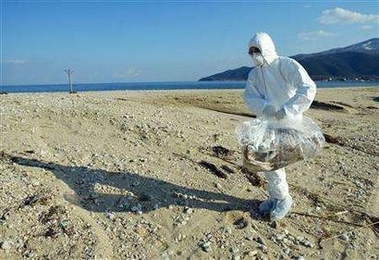|
Europe moves to halt bird flu spreading
(Reuters)
Updated: 2006-02-16 09:58
New alarm bells over bird flu rang out in the heart of Europe on Wednesday,
prompting governments to step up efforts to prevent a potentially devastating
outbreak of the deadly H5N1 strain of the virus.
Germany became the
fourth European Union country to detect H5N1, saying additional tests on two
dead swans had confirmed its presence, first shown by preliminary results on
Tuesday. Authorities later said they had also found the virus in a hawk.

A Greek health
official carries a dead swan from a beach of Stavros town in northern
Greece, some north of Athens, February 12, 2006.
[Reuters] | "Unfortunately it has been confirmed
that the swans were infected with H5N1 from Asia," Reinhard Kurth, head of the
Robert Koch Institute, told German television. "We have no doubts whatsoever any
more."
Other European countries, including Hungary, tested samples from wild birds
for the virus that can kill humans in its highly pathogenic form. Bird flu is
highly contagious among poultry.
Russia, which first reported H5N1 in poultry last year, and Italy, which
found its first cases at the weekend, reported new incidents of the virus.
Italy's were in wild swans, while Russia's were at a battery farm in the
Caucasus.
The virus has already penetrated some industrial chicken farms in Russia,
resulting in mass culling, and it is fear of a similar situation developing in
the EU that has led governments to introduce tight controls over domestic
poultry.
Preliminary tests showed no signs of bird flu in three dead swans found on a
Baltic beach in the northern Polish city of Krynica Morska, local authorities
said.
DEVASTATING VIRUS
Transmission of H5N1 to domestic flocks could be devastating for the EU's 20
billion euro ($24 billion) poultry and egg industry. The Netherlands had an
outbreak of a different strain of bird flu in 2003 that led to the culling of 30
million birds, more than a third of the flock.
Measures being taken to stop the spread of the virus include bans on keeping
poultry out of doors. Germany brought forward such a ban to February 17, while
the Netherlands said it was considering a similar move.
"We must stress the message that bird flu has been found in wild birds only
and not in farm animals," said Thomas Janning, a spokesman for German poultry
industry association ZDG.
The EU banned all imports of untreated feathers until the end of July.
Experts have said the virus could spread further into Europe shortly in
spring when migrating birds return after wintering in Africa.
In Africa, where experts say the risk of transmission to humans is higher
than in other regions because millions of people live in close contact with
domestic birds, Nigeria reported more suspected outbreaks in birds.
At present, humans can contract bird flu only through close contact with an
infected bird, but experts fear H5N1 may mutate into a form that can spread
between people and cause a pandemic that could kill millions.
Highly pathogenic H5N1 has killed at least 91 people in Asia and the Middle
East, according to the World Health Organization. There have been no human
infections in Africa or Europe.
NIGERIAN QUARANTINE
Implementation of preventive measures in Nigeria has been slow in some places
but a top veterinary expert said farmers were starting to abide by quarantine
rules because the government had confirmed it would pay them compensation.
"Initially it was the panic selling that made it spread. Animals were being
moved from farms so that farmers wouldn't lose everything," said Lami Lombin,
director of the laboratory testing poultry samples.
Neighboring Niger sent health experts, vets and soldiers to help protect the
1,500 (900 mile) border as fears rose that the virus could spread. For farmers
in one of the world's poorest nations, the consequences of an outbreak were
frightening.
"I am very worried because the death of one chicken could destroy my entire
capital," said chicken farm owner Hamani Labo.
Senegal said it would host a regional conference next week for trade and
livestock ministers of the Economic Community of West African States (ECOWAS),
aimed at forging a concerted effort in combating the spread of the
virus.
|